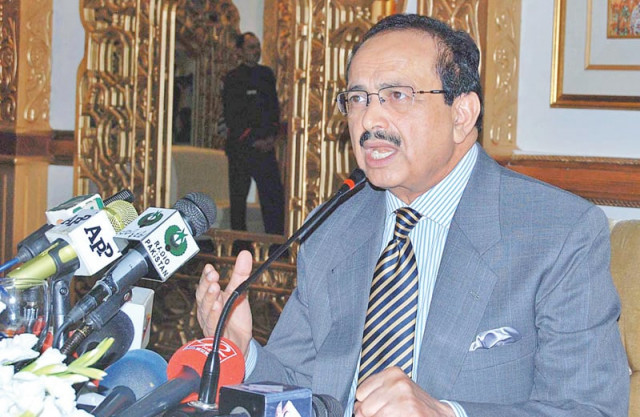NAVTTC to hold national skills competition
Technical training commission chief says assessments of training programmes improved

NAVTTC Executive Director Zulfiqar Ahmad Cheema addresses a news briefing. Photo: aPP
The National Skills Competition, organised by the National Vocational & Technical Training Commission (NAVTTC) will be held at the Pakistan National Council of the Arts (PNCA).
Briefing the media on the performance, challenges and future targets of the organisation, NAVTTC Executive Director Zulfiqar Ahmad Cheema said that the skills competition has proven to be a game-changer as it’s been helping skilled youth get jobs.
The national competition will see thousands of youngsters who have already cleared their zonal and provincial skill competitions.
The youngsters will display their skills in various fields and will be observed by industrialists and entrepreneurs. The idea is that these industrialists and entrepreneurs can then snap up technically skilled trainees from various technical and vocational institutions.
Apart from the impending job prospects, champions in each of the 11 technical trades stand to win a Rs100,000 prize. First runners-up will receive a Rs75,000 cash prize while the third position holders will receive Rs50,000.
More than the money, the winners will receive their prizes from the President of Pakistan, Cheema said.
The trainees, the NAVTTC officials said, will compete in different disciplines including industrial electrician, plumber -pipe fitter, heavy machinery operator, professional cooking, welding, beautician, fashion designing and dressmaking, auto mechanic, photography and documentary production, tiles fixers etc.
Over the past few years, we have taken steps to create awareness regarding the importance of skill development and now we receive nearly four times the number of applications against the allotted seats, Cheema said, adding that from training 25,000 young boys and girls annually, NAVTTC was now training 100,000 people every year.
Apart from the increased interest in training offered, Cheema said that they had worked to improve the quality of training; moreover, their monitoring process had become effective.
It is compulsory for training institutes to conduct tests of trainees every month, he said, adding that it would be in addition to mid-term examinations and a skills competition after five months.
To ensure this schedule is followed, Cheema said that NAVTTC officers visit training institutes regularly to monitor the quality of training and performance of instructors.
“Old and outdated examination system is being replaced with modern assessment methods under which 90 per cent of exams are based on practical tests. Moreover, out of three assessors, two must belong to the relevant industry.”
For guiding the youth, he said, Job Placement Centres have been established in Islamabad, Lahore and Karachi which have resulted in better employment opportunities for them.
Further, Cheema said that previous collaboration efforts with the industry were insignificant, but steps were being taken to strengthen this collaboration through Sector Skills Councils.
“We do not have any dearth of skilled labour,” he maintained, adding that there were thousands of people who have learned the skills informally and hence do not have any certificates or certifiable proof for their skills which is why they are considered as unskilled abroad.
“To bring these informal trained workers into the national economy, we have initiated a system of Recognition of Prior Learning (RPL) and thousands of skilled workers are being assessed in Lahore, Karachi, Peshawar and Islamabad who will be certified after passing certain tests,” Cheema added.
Moreover, he said that Pakistan is now a member of the World Skills Council and has become a part of the world community in the field of technical and vocational education sector. These memberships, he hoped, would create tremendous employment opportunities for Technical Vocational Education and Training (TVET) graduates and allow them to participate in the world skills competitions.
“This will help in strengthening our collaboration with the international TVET community and we will be able to learn from the experiences and best practices of the developed countries in TVET sector,” he added.
Published in The Express Tribune, October 23rd, 2017.



1724319076-0/Untitled-design-(5)1724319076-0-208x130.webp)















COMMENTS
Comments are moderated and generally will be posted if they are on-topic and not abusive.
For more information, please see our Comments FAQ